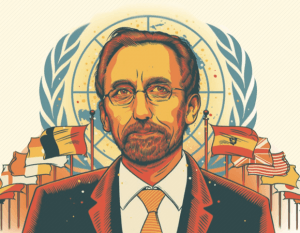Tom Fletcher in Prospect:
 The Hague, September 2016. The speech from the UN high commissioner for human rights was not expected to ruffle feathers. A mild appeal to our better angels and then back to the canapés—traditionally, as one UN speechwriter puts it, “we don’t use adjectives, we don’t name names.”
The Hague, September 2016. The speech from the UN high commissioner for human rights was not expected to ruffle feathers. A mild appeal to our better angels and then back to the canapés—traditionally, as one UN speechwriter puts it, “we don’t use adjectives, we don’t name names.”
But instead of platitudes, Zeid Ra’ad Al Hussein called out a parade of “xenophobes, populists and racists”: Wilders, Farage, Orbán, Le Pen, Trump and—in the same breath—Islamic State (IS). He shook with rage. The room was stunned into silence, then burst into a standing ovation. One ambassador present calls it “a moment of pure authenticity, emotion and reason.” A friend calls it Zeid’s “quantum leap.” But this was not simply a frustrated UN chief shooting from the hip. “He knew exactly what he was doing,” says his wife, Sarah.
There is an air of battered decency to the UN’s top official on human rights. Partly jet lag and the debilitating wade through undrained swamps of bureaucratic treacle. Partly bearing witness to the worst of humanity. As a junior UN official in Bosnia, he was profoundly marked by the sight of the skull of a child as a trophy on a warlord’s car. In a recent statement on Myanmar, he asked: “What kind of hatred could make a man stab a baby crying out for his mother’s milk. And for the mother to witness this murder while she is being gang-raped by security forces who should be protecting her?”
But the weariness is also something deeper. This is a man watching his worldview come under relentless assault. Zeid was a global citizen before the idea went in and then out of fashion.
More here.
